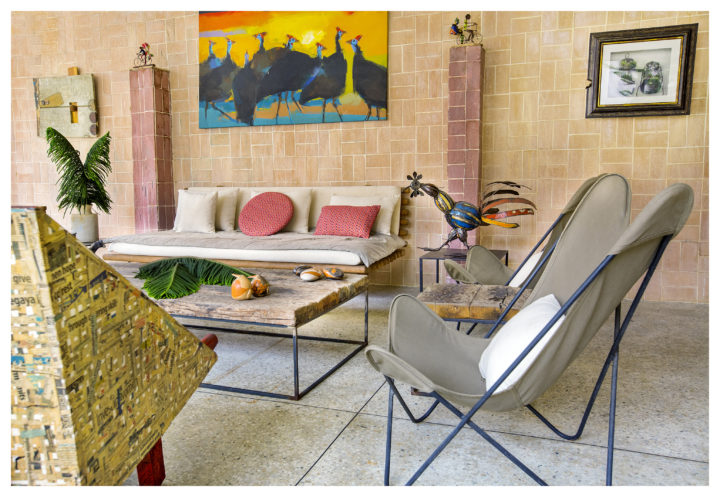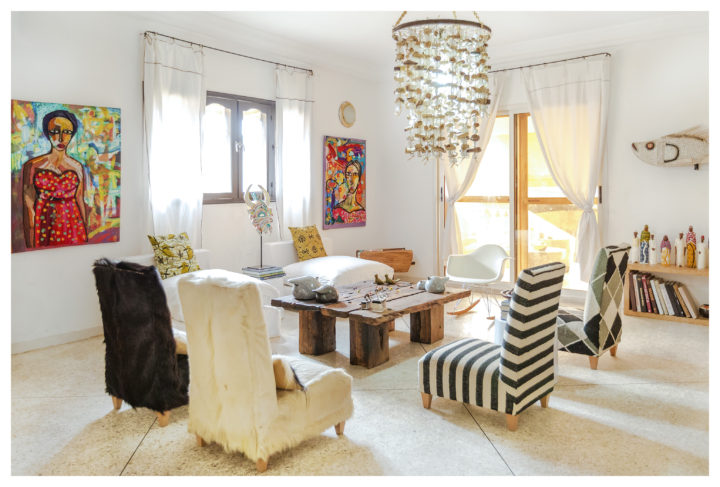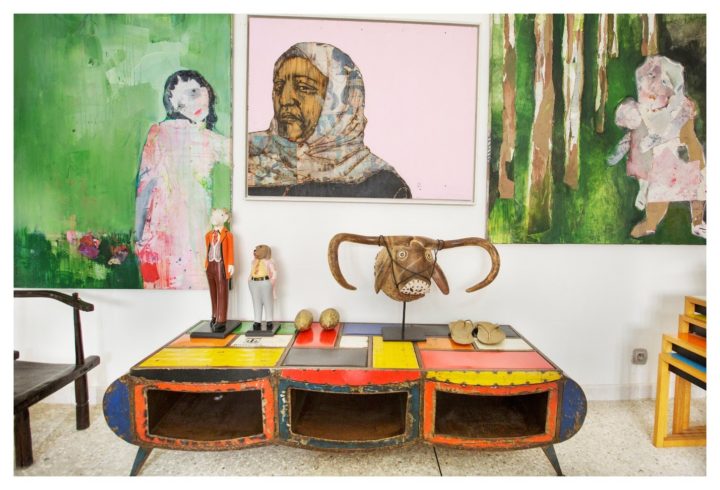Today I invite you to the very first edition of Blueprint Africa’s new home tour series: We Live in Trees focused on unpacking ‘African inspired’ decor. It is my cheeky response to the cringe-worthy question many first generation Africans were faced with while living in the ‘West’. The series will focus on the interiors of everyday Africans – the wealthy and underprivileged alike. I will invite you into the homes that I consider shrines to design in some unique way. I hope you will join me regularly as I peel back our thatch roofs and show you some true African hospitality. First up on the discovery tour: the home of multi-dimensional fashion brand owner Furaha Bishota.
- Who: Furaha Bishota, fashion entrepreneur and owner of East African brands CocoLili and Kikapu
- What: 6-bedroom, two-storey detached single family home
- Where: Riviera Bonoumin, Abidjan, Cote d’Ivoire
- Why: “Because one’s environment is crucial to the creative process.”
- How: Rented, through an agent
Furaha disowns the title of designer for fear of appropriating something to which she is not entitled given her lack of formal education in fashion. With a background in chartered accountancy and audit, she sees herself more as a fashion entrepreneur and creative than a designer. Following the success of her African inspired handbag and accessories brand Kikapu, Furaha is now launching her second label CocoLili dedicated to women’s business attire.
“I wanted to create a clothing brand that offers timeless pieces in vibrant prints that caters to women with a pear shaped figure. CocoLili although African in origin can be worn across cultures and continents. This is the reason that I chose to design my own prints for the label. The prints draw inspiration from Africa but, to me, transcend any specific culture.”
Finding it difficult to describe her interior style “because I pretty much love everything”, Furaha settled on a contemporary rustic aesthetic which speaks to her love of texture and art. Despite her blossoming fashion brand empire, Furaha still maintains a demanding full time job while also raising three children. During the photo shoot her youngest two kids run gleefully in circles around photographer Rwolhand Tayoro as he set up in the middle of the gazebo and outdoor terraces – spaces that are usually the children’s play areas. When asked how she manages her side hustle, professional career and motherhood she gives all praise to her housekeeper.
“I give most of the credit to my super nanny Awa who has been with us for fifteen years. She does a phenomenal job of looking after my kids and managing the house. I wouldn’t have been able to accomplish what I have without her.”
Furaha’s life centers mainly on the first floor of her home with several bedrooms serving primarily as storage for her regular African inspired décor hauls. Her bedrooms serve a mainly utilitarian function and are comparatively sparse relative to the rest of the home.
“I don’t sleep much. I have a very non-conventional routine. I am usually in bed by 8:30pm and then I am up from between 12:30am to 3am to work on my projects. I am less distracted during these hours and can actually hear myself think, so I am able to entertain all the wild ideas that come into my head.”
Furaha describes her appetite for art as “insatiable”. She counts the likes of Mederic Turay and Hermann Boussou among her favorite new artists. However, home design is not always a pleasant topic for Furaha as it brings up painful memories of a close friend and dreams dashed.
“I started designing my ultimate dream home with the help of Ross Langdon, a genius architect from Australia who was tragically among the victims of the terrorist attack on West Gate Shopping Mall in Nairobi in 2013. Ross specialized in unconventional sustainable design solutions and we were working on a courtyard-style house. The idea was to have a family home that was at the same time a gallery. Fortunately, I will be able to continue realizing my dream house with the help of Ross’s former colleagues.”
I ask Furaha at the end of our tour, what is her takeaway from ongoing trends in African inspired design. She says she loves the fact that the creative scene is becoming more mainstream and that it is not as shunned upon as it was in the past. In her view, artists and creatives can now make a living doing what they are passionate about. She adds that what makes her even happier is the fact that Africans themselves are now becoming consumers of those art works. She believes that in the creatives business there is room for every one with an idea. What is of most importance in her opinion is the ability to be patient, and to not take shortcuts or give up until you realize your dream.
Photography all rights reserved: Rwolhand Tayoro
Get the Look!
- Chandeliers, Green Room
- Sofas, Zina Boutique
- Table décor, St. George’s of Ethiopia
- Hide chairs, Rock the Kasbah
Below are selections from the CocoLili Look Book Spring 2016. Order at info@cocoliliafrica.com.

























